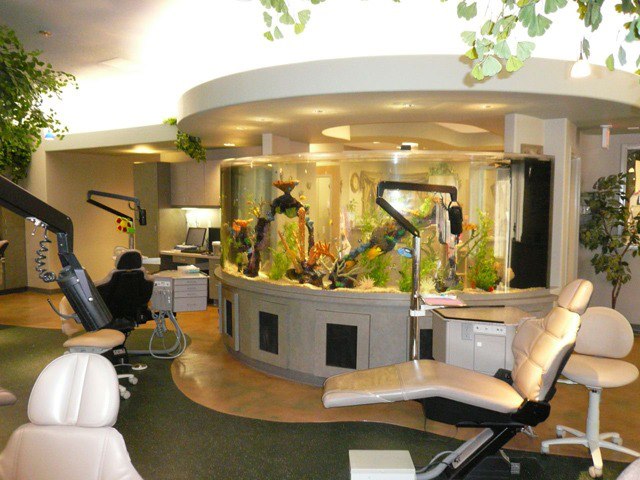Normal Aquatics designs and fabricates custom aquariums in Connecticut, New York, New Jersey and surrounding areas. A popular question we receive from customers seeking custom aquarium services in Connecticut is whether to utilize glass or acrylic materials. The difference between glass and acrylic custom aquariums lies in the material used to construct them and their respective characteristics. Here are the key distinctions:
- Material: Glass aquariums are made of glass panels, typically constructed with silicone seals to hold them together. Acrylic aquariums, on the other hand, are constructed using sheets of acrylic, a type of plastic known for its transparency and strength.
- Weight: Glass aquariums are generally heavier than acrylic aquariums. Glass is denser and heavier, which means that glass aquariums require sturdier support structures. Acrylic aquariums are lighter, making them more suitable for situations where weight is a concern, such as in installations where the tank needs to be mounted on a wall.
- Clarity: Glass aquariums tend to have better optical clarity, providing a clearer view of the aquatic environment. Acrylic aquariums can sometimes have a slightly hazy appearance, especially if not maintained properly. However, the clarity of acrylic can be improved through polishing and proper care.
- Strength and Durability: Acrylic aquariums are generally more impact-resistant than glass aquariums. Acrylic is more flexible and less prone to cracking or shattering under impact, making it a safer option in environments where accidental impact is a concern. Glass aquariums are more rigid and can be more susceptible to cracking if subjected to extreme force.
- Shape and Customization: Acrylic is more pliable than glass, allowing for more intricate and custom shapes in aquarium design. Acrylic can be easily molded, bent, or curved, making it more versatile for creating unique and non-traditional aquarium shapes. Glass, on the other hand, is less flexible and often limited to standard rectangular or square designs.
- Scratch Resistance: Acrylic is more susceptible to scratching compared to glass. While both materials can get scratched, acrylic is softer and more prone to surface scratches from cleaning or accidental contact with hard objects. However, minor scratches on acrylic can often be polished out, whereas scratches on glass are typically permanent.
- Cost: Acrylic aquariums are generally more expensive than glass aquariums of the same size. Acrylic is a higher-priced material and the manufacturing process for acrylic aquariums requires additional expertise and precision.
When deciding between glass and acrylic custom aquariums, it is important to consider factors such as budget, desired shape or customization options, weight restrictions, and the specific requirements of the aquatic environment. Each material has its advantages and considerations, so Normal Aquatics offers no-cost consultations to help you to determine the best choice for your specific needs.
You can click the following link to view our many 5-star Google reviews we have received from satisfied clients. You can contact us today at (203) 292-5922 to schedule a quick no-cost quote!

